
Introduction
In June 2024, nearly 100,000 Japanese netizens clicked the joint button on Change.org to demand that Ubisoft stop selling Assassin’s Creed: Shadows, less than a month after Ubisoft released a new trailer for the game (May 16). The game, which was already highly anticipated before its release, set its world in the Warring States Period of Japan, which undoubtedly caught the attention of many Asian players. However, what is surprising is that in Assassin’s Creed: Shadows, Ubisoft continues the dual protagonist setting of Assassin’s Creed: Syndicate, and the new hero is a black samurai named Yasuke, which makes many players can not accept this setting, especially at the height of the anti-political correctness of today’s gamers (van Leusden, 2018). While all of Assassin’s Creed’s predecessors have featured locals in that world, Assassin’s Creed: Shadow, which is considered to be Ubisoft’s most ambitious new production, uses a foreigner as its main character, which has drawn the anger of Japanese gamers and many anti-political correctness groups, who believe Ubisoft is rewriting history.
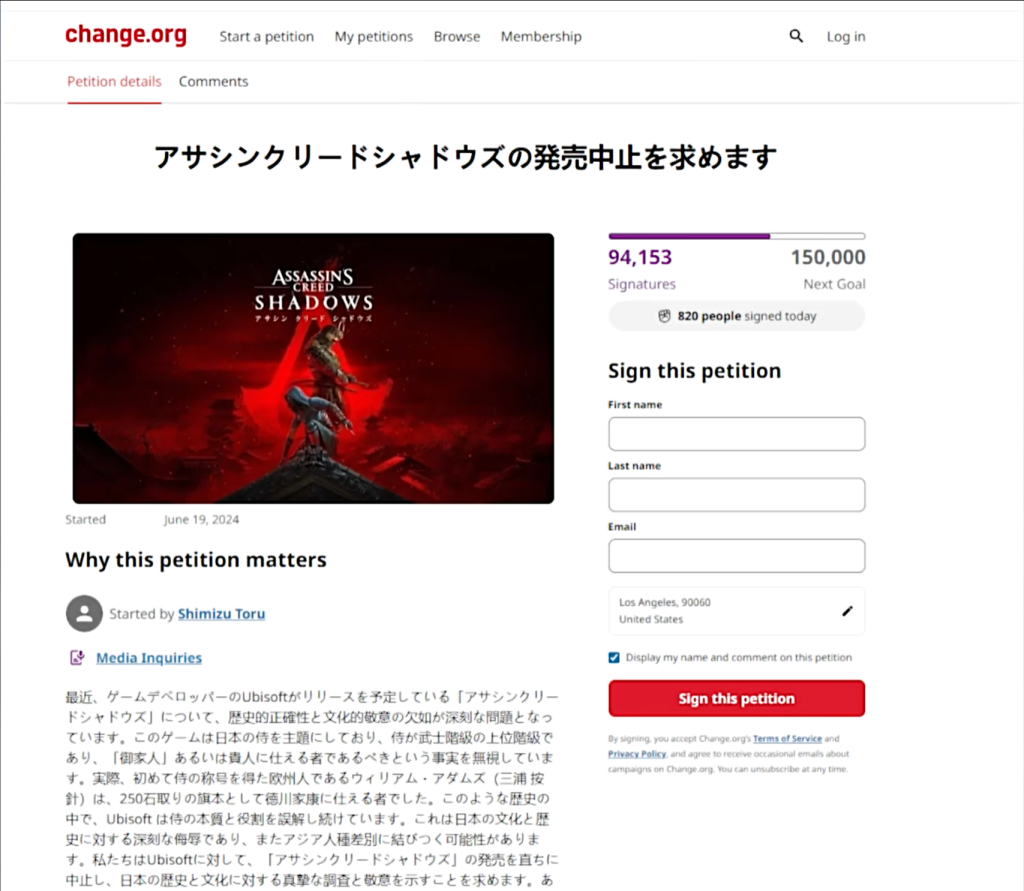
Facing heavy criticism from players, Ubisoft postponed the game twice, during which Ubisoft’s stock price plummeted 14% (Grummz, 2024), so Ubisoft’s choice of Yasuke as the male protagonist is really just to cater to the tide of political correctness?
The answer is no, and this controversy goes far beyond “political correctness” – it exposes the most dangerous epidemic of the digital age: history is being “magicked” (Schaff, 1960).
The historical Yasuke
First of all, I have to answer a question that many people may wonder: Did black people really exist during the Warring States period of Japan? The answer is yes. In the middle of the 16th century, European voyagers and missionaries arrived in Japan one after another, and they left many records of letters, which became valuable records of Japanese social conditions during this period. When Portuguese missionary Alessandro Valignano sailed to Japan with slaves in 1546, he was welcomed by the locals, and a large number of Japanese fought over the right to watch the blacks in the front row. Oda Nobunaga, out of curiosity, undressed to check his skin tone. Yasuke then stayed with Oda Nobunaga as a “gun servant”. Less than a year and a half later, the change in the Kanji Temple occurred, and the historical record of the Yasuke after Oda Nobunaga’s death ended there(Fróis, 2014). From these few historical records, it is impossible to prove that Yasuke made any important historical contribution to Nobunaga, or that he acquired samurai status. According to some Japanese literary works about Yasuke(e.g. Black Yasuke), Yasuke is always a sincere servant, and he can’t control the development of Japanese political situation. For the positioning of the masterpiece, Japanese literary and artistic creators, in the later for a long time, have a certain tacit understanding, that is, you can add some drama, but not a samurai, but a loyal servant.
Who made the Black Samurai Yasuke?
In February 2013, during African American History Month (February), the U.S. Military Base Iwakuni in Japan published an article with a portrait of Yasuke, titled The Legend of Yasuke, which embellishes much of the lack of historical evidence and is the first to claim that Yasuke was the “first African samurai.” It attempts to create an inspirational image of the black people at the bottom to achieve class crossing in Japan(National Archives, n.d.). The accompanying pictures in the article became the starting point for the spread of the image of Yasuke in the West.
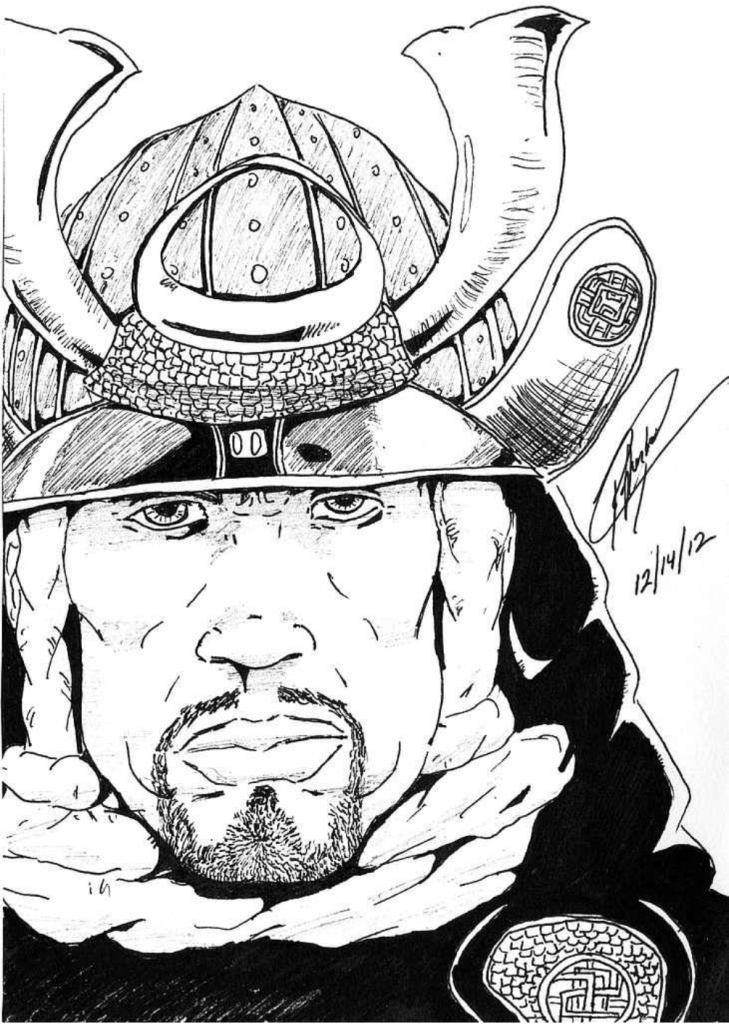
In just a few years, Yasuke went from a faceless figure with few historical records in Japan’s official history to a “Darth Vader” who was considered by some Westerners to be all-powerful in Japan. An associate professor of law at Nihonin University named Thomas Lockley has played an instrumental role in this godmaking movement, injecting a great deal of disturbing misinformation into Western understanding of Yasuke. In 2016, he began to publish articles about the historical story of Yasuke, and made a number of views that have never been proven, including that Yasuke worked for the Indian royal family, and the Jesuits, had received military training, was strong and loyal; He traveled to China, spoke many languages, was regarded in Japan as the embodiment of the legendary dark-skinned Buddha, and eventually rose to the upper echelons of Japanese society, etc. (Lockley & Girard, 2019). What’s more, Lockley has been tampering with his Wikipedia entry since 2015, with references directly referencing his own work, which was still in print at the time. It is even more ironic that the Encyclopaedia Britannica, known as “the most authoritative in the world today”, invited Lockley as an expert to compile the article when it was established. Even though there are many loopholes, in the eyes of Western media, the “Yasuke legend” constructed by Lockley has become the official history in the eyes of Western people. His works are widely cited as academic achievements.
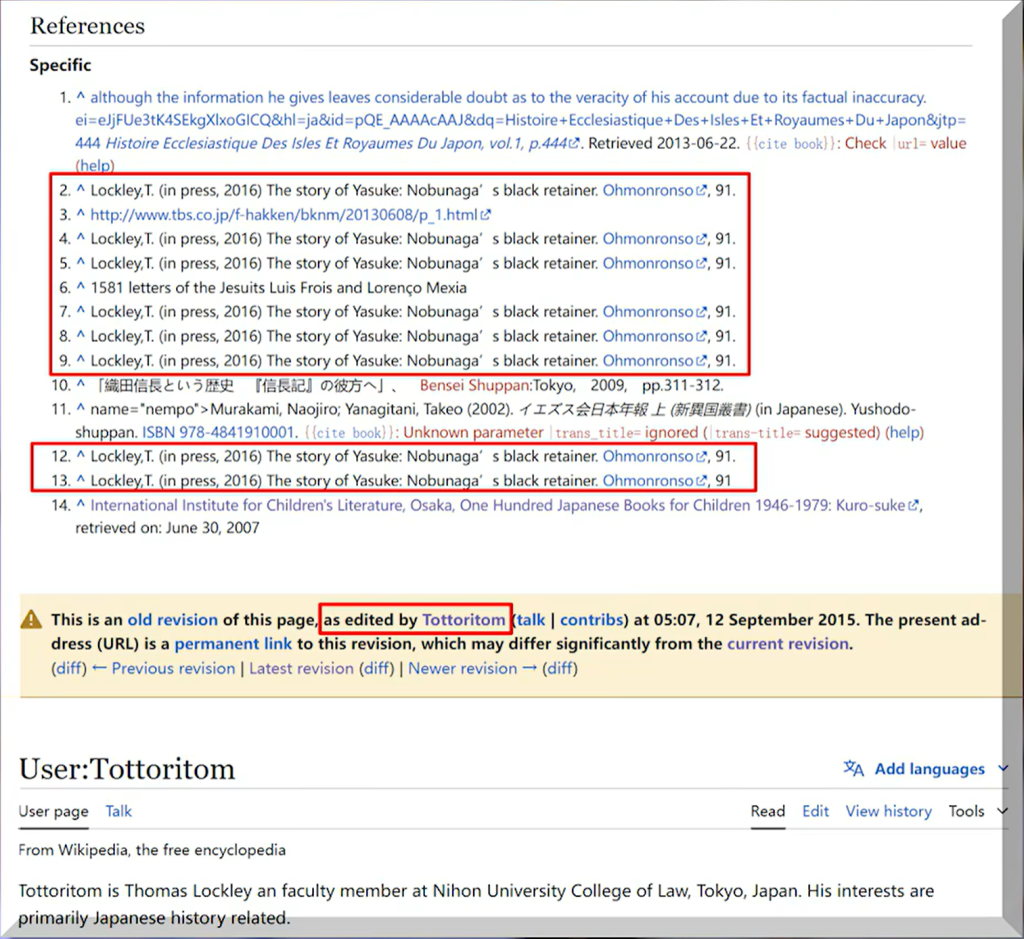
Why do we willingly swallow false history? — Cognitive traps in the digital age
In today’s digital media age, we have entered the age of disinformation(Livingston & Bennett, 2020), where traditional democratic institutions(e.g., independent judicaries, professional journalism, scientific reviews) used to act as “gatekeepers” to filter out disinformation, but their credibility has been weakened by neoliberal policies (e.g., deregulation, money politics). Resulting in a “cognitive vacuum” in the public sphere(Livingston & Bennett, 2020). This leads to a lot of false information everywhere, which not only appears in People’s Daily life, but also appears in a large number of important political occasions, such as Trump’s release of several false statements per day before the 2018 midterm elections (such as “Ukraine interfered in the 2016 election”); 1988 Bush campaign AD “Willie Horton” (Willie Horton) fictional Democratic candidate Dukakis “coddled black criminals”, using racial fear to win the election; The Russian Internet Research Agency (IRA) spread false information about “Hillary discriminates against blacks” against African Americans in the 2016 election, and intensified social division. False information has become a tool used by various organizations and individuals(Livingston & Bennett, 2020). Flew (2021) states that “disinformation” is part of political propaganda. The same is true for the protagonist of this article, Yasuke. Since 2013, the BLM movement has inspired the whole society to reflect on the “marginalization of black people in culture”, and Yasuke’s status and attention as a “black Japanese” have significantly improved. Since 2013, discussions on “African samurai Yasuke” on Quora, Reddit and other forums have increased significantly. And it is firmly claimed that Yasuke was given the title of samurai. (Reddit, 2013).
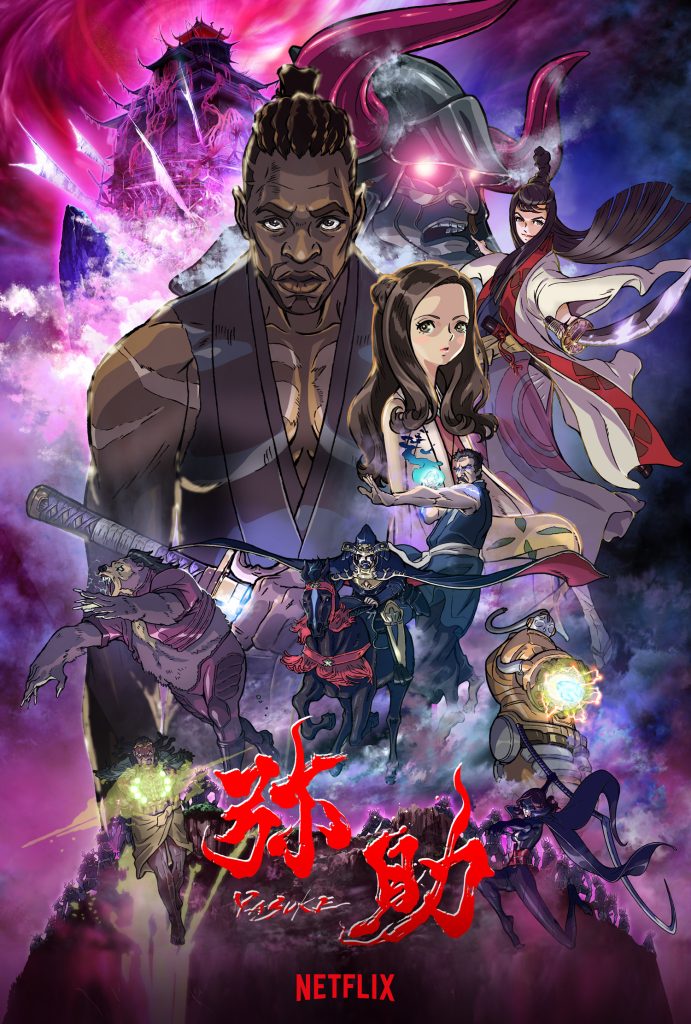
Bruns, Harrington, and Hurcombe (2021) divide the spread of 5G/COVID-19 conspiracy theories into five phases (from fringe to mainstream), revealing its “ripple effects.” It’s not hard to see how Yasuke’s rising profile mirrors this pattern. Both of them have experienced the process of “industrialization of disinformation” from fringe novelty hunting to mainstream endorsement. From Iwakuni’s Posting and accompanying pictures, to numerous posts discussing Yasuke, to Lockley’s writings and numerous interviews about the history of Yasuke, the image of the Japanese samurai has completed its global spread. Lionsgate and MGM have both approved live-action films of Yasuke, and in 2021 Netflix produced anime “Samurai Yasuke”, which even turned Yasuke into a powerful samurai with combat power as high as his own. At this point, Yasuke’s character has been localized and narrative upgraded. In February 2024, when Shogun, an American drama set in Japan’s Warring States period, was aired overseas, protests were sparked because it did not feature Yasuke. Meanwhile, African bloggers with Twitter followers posted numerous photos alluding to captivating black Japanese samurai with the caption “Black samurai that mainstream media will never show you, leave your comments on this.” These obviously rhythmical AI diagrams, however, have been retweeted more than 10,000 times on Twitter(African Hub, 2023), at which time Yasuke has completely gone to the extreme in people’s hearts and become a real black hero. Each ‘mutation’ of Yasuke makes misinformation more contagious.
Benkler, Faris, & Roberts (2018) points out that disinformation is “deliberately spread false or distorted information to achieve political goals (such as discredit opponents, inciting social division). Thomas Lockley, as a British associate professor at a Japanese university, discovered the hidden political wind in Yasuke. There is a strong market for “minority hero narratives,” and Yasuke happens to be the kind of “cross-cultural, underrated, larger-than-life” material that can be made into “black historical heroes.” Lockley’s motive, then, could be to create an “African-American hero” to satisfy the market’s need for a politically correct narrative. Lockley is not a figure in central historical scholarship, and his work is not widely found in the study of serious Japanese or African history. He initially came to Japan to teach English, but he quickly rose to prominence as an important voice in a certain type of “unconventional historical” discourse by packaging it as an obscure figure. Ubisoft even invited Lockley to serve as a historical advisor for Assassin’s Creed, giving numerous interviews that touted the true history of its Yasuke. His work has been cited by Netflix, game companies, publishers, and university courses. Therefore, the appearance of the image of Yasuke is actually a cultural planning based on political purposes. Scholars and media platforms use historical fragments, magnify the few evidences, and match the current political and cultural atmosphere to package Yasuke from a vague real figure into a “black hero” that conforms to the current value narrative. In this context, the rise of a ‘black samurai’ served not only as an act of cultural defiance but also as a market response to the prevailing desire for diversity.
However, the distortion of Yasuke’s image is not the result of one-way manipulation, but a two-way interaction of “supply and demand collusion”. Americans’ trust in newspapers and television news declined significantly between 1973 and 2018 (newspapers fell from 60% to 20%) (Flew, 2021). The lack of trust makes the public more dependent on the “echo chamber effect” of social media, which also exacerbates the spread of disinformation (Flew, 2021). Users face a lot of information every day (social platforms, YouTube, headlines, Netflix, Wikipedia, etc.), but they have limited time, energy, and fragmented attention, so it is easier for users to: Choose information that is “immediately understandable” and “emotionally relatable,” and automatically ignore or refuse to spend time analyzing “complex, obscure, and scholarly” historical facts.
For example:
The phrase “Yasuke was an African samurai who helped Oda Nobunaga fight Japan” is easier to understand, graphic, and satisfying a certain emotional pleasure than “Yasuke’s true identity is still in dispute.”
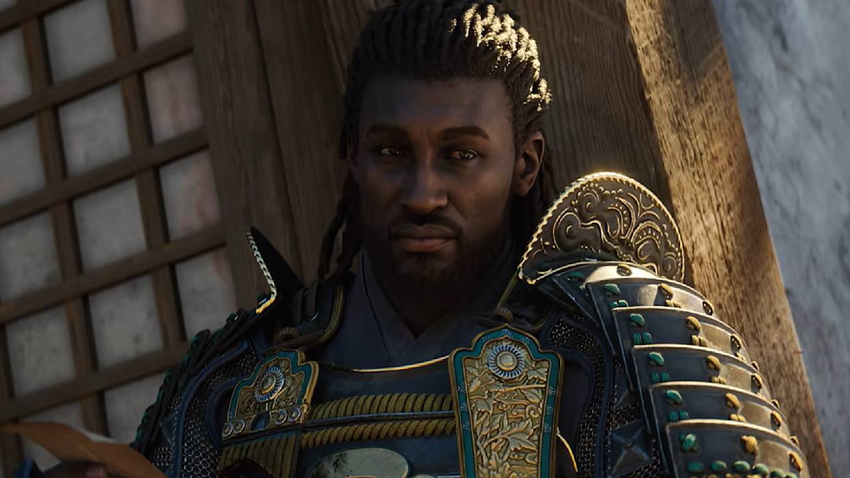
Allcott and Gentzkow (2017) point out that users have difficulty distinguishing between high-quality news and fake news, and that the latter can provide “psychological utility” (such as strengthening political positions), a “confirmation bias” that makes false information more prevalent among certain groups. Users would rather accept the “It may be fake, but I want it to be true” narrative.
On the basis of all this, the platform only needs to push more similar content through the algorithm(Just & Latzer, 2017), thus forming a group of users group illusion.
Conclusion
Ultimately, the Yasuke controversy is more than a debate over historical accuracy—it is a mirror reflecting our broader struggle with the manipulation of truth in the digital age. To safeguard our collective historical memory, it is imperative to develop robust ‘digital archaeological’ practices, such as integrating AI-driven document tracing on platforms like Wikipedia, and encouraging media transparency models akin to those used in popular historical games like Civ 6. Only through these measures can we hope to distinguish genuine historical narratives from those tailored to suit fleeting market and political trends.
One last thing to remember: As you control Yasuke’s Ninja Storm in the game, remember: Real history has no skill tree and no resurrection point – every thumbs up to a false narrative is a vote for collective amnesia in the digital age.
History never changes, only the way we tell stories.
Reference
van Leusden, J. (2018, December 14). Are video games increasingly mirroring globalized society? Diggit Magazine. https://www.diggitmagazine.com/papers/video-games-globalization
Grummz. [@Grummz]. (2024, August). Keep hitting @Ubisoft in the junk. Stop buying their games and force them to rethink DEI. They are one of the largest infected studios. [Tweet]. X (formerly Twitter). https://x.com/Grummz/status/1815062162014146856
Schaff, A. (1960). Why history is constantly rewritten. Diogenes, 8(30), 62–74. https://doi.org/10.1177/039219216000803004
Fróis, L. (2014). The first European description of Japan, 1585: A critical English-language edition of striking contrasts in the customs of Europe and Japan by Luís Fróis, S.J. (D. T. Reff, R. Danford, & R. Gill, Eds. & Trans.). Routledge.
National Archives. (n.d.). The legend of Yasuke – A drawing of a man wearing a viking helmet. National Archives. https://nara.getarchive.net/media/the-legend-of-yasuke-785ca8?utm_source=chatgpt.com
Lockley, T., & Girard, G. (2019). Yasuke: The true story of the legendary African samurai. Hachette UK.
Livingston, S., & Bennett, W. L. (2020). A brief history of the disinformation age: Information wars and the decline of institutional authority. In S. Livingston & W. L. Bennett (Eds.), The disinformation age: Politics, technology, and disruptive communication in the United States (pp. 3–40).
Flew, T. (2021). Disinformation and fake news. In Regulating platforms (pp. 86–91; pp. 111–114 in some digital versions). Polity.
Reddit. (2013, August 5). He was the first and only black samurai who died. Reddit – r/facepalm. https://www.reddit.com/r/facepalm/comments/1bem5ey/he_was_the_first_and_only_black_samuraiwho_died/
Bruns, A., Harrington, S., & Hurcombe, E. (2021). ‘‘Corona? 5G? or both?’: The dynamics of COVID-19/5G conspiracy theories on Facebook. Medi International Australia, 177(1), 12–29.
African Hub. (2023, April 22). The first known black samurai in Japanese history was Yasuke, a man of African origin who lived in Japan in the late 16th century. X. https://x.com/AfricanHub_/status/1628365302093193217
Benkler, Y., Faris, R., & Roberts, H. (2018). Network propaganda: Manipulation, disinformation, and radicalization in American politics (Kindle ed., Chapter 8). Oxford University Press.
Allcott, H., & Gentzkow, M. (2017). Social media and fake news in the 2016 election. Journal of Economic Perspectives, 31(2), 211–236. https://doi.org/10.1257/jep.31.2.211
Just, N., & Latzer, M. (2017). Governance by algorithms: Reality construction by algorithmic selection on the internet. Media, Culture & Society, 39(2), 238–258. https://doi.org/10.1177/0163443716643157

Be the first to comment